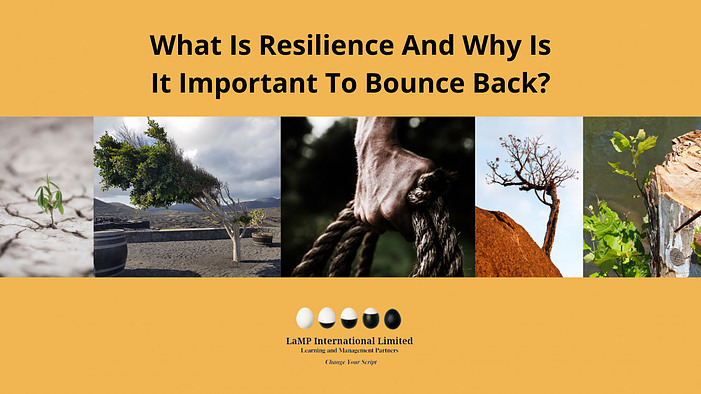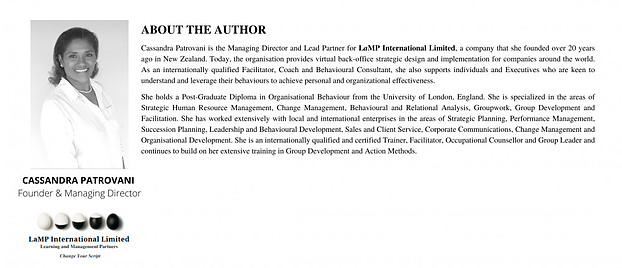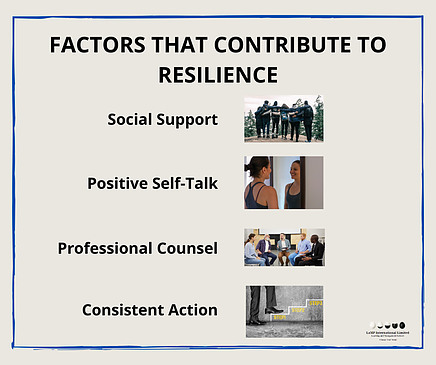
There is no place like nature to help you to understand what is resilience and why it is important to bounce back. Nature personifies resilience.
I have heard resilience being described as “a woman in labour” because, at times, it requires you to bear great pain and still deliver results. It makes sense.
If nothing else, resilience is one of those “soft” characteristics that separates “the men from the boys” and succeeding from failing.
Resilience helps you to Change Your Script!
What Is Resilience And Why Is It Important To Bounce Back?
Resilience is the ability to be strong and to persevere even when facing undue stress and adversity. It is important to bounce back because if you don’t, you may be facing failure, death or extinction. Life happens! Shit will happen in life. It is YOUR ability to rebound and reposition yourself that will determine how you survive and if you thrive. If you are not resilient, you will struggle to move forward and sustain healthy, consistent growth.
Key Takeaways
- Learn the benefits of becoming resilient.
- Discover the key factors that will make you strong and resilient.
- Resilience can redefine how you lead and manage in the workplace.
- Change becomes a welcomed way of life when you embrace resilience.
Back to nature.
Trees and plants offer some of the best examples of resilience.
Think of the four seasons.
They are examples of survival, rebirth and reinvention. During winter, it appears that everything dies. Trees lose their leaves and plants wither and retreat into the dirt. The landscape is left barren.
But then spring comes and with it leaves and shrubs start to emerge gradually bringing back colour and hope.
That is what a resilient human spirit also carries. Evidence that with strength and determination, life can be reborn.
The Benefits Of Resilience
There are three (3) main benefits of resilience that will help you to appreciate its importance.
1. It improves mental, emotional and physical health and their outcomes.
Becoming resilient is like taking your mind, emotions and body to the gym and giving them a hard workout. The more resilient you become, the clearer your mind gets. That is because you become more congruent with what is happening in your life.
This does not mean that you accept whatever comes at you. Rather, it means that you embrace what comes at you and work with it to find solutions and make your life better.
2. It enhances your problem-solving skills.
Remember the saying: “When life gives you lemons, make lemonade“? That’s being resilient!
The more you exercise those mental and emotional muscles by trying to create and innovate, the stronger they get. After a while, you start seeing more solutions than problems and the colours of life start to shine brighter.
3. It makes you more adaptable and strengthens your relationship with change.
If there is one thing that is constant, it IS change. Nothing stays the same so why should you?
The buzz these days is Artificial Intelligence (AI) and what it will do to us humans and our work. I lived through these conversations in the early 80s.
I do not see AI as bringing loss and defeat to us. I see the opportunities that exist. Now, I can get mundane administrative tasks out of the way and allow the world to see more of my creative and unique side and share my points of view.
Just like I am doing in this blog post!
4. It makes you a better (dis)stress manager and helps you to cope better with life’s ups and downs.
This is a summary of 1 to 3.
I believe that congruence is a strategy that helps us to improve and strengthen our capabilities and competencies. When your thoughts, words, feelings and actions are aligned – congruent – doubt, conflict and confusion are minimised. Then, you are able to function on a foundation of eustress – beneficial stress – and use that to propel yourself to success with greater ease and enjoyment.
READ MORE ON BEING CONGRUENT >>> What Does It Mean To Live A Congruent Life?
Factors That Contribute To Resilience
I have spent years understanding the effects that resilience can have on my life and the life of thousands around the world. As a Facilitator, Coach and Counsellor, I have been fortunate to benefit from these experiences.
There are a few common factors that regularly contribute to resilience.
1. Social Support
Human beings are pack animals. We thrive in a community and we were not meant to be alone. To function healthily, we all need the healthy support of others. The 2020 pandemic was a much-needed reminder of this.
2. Positive Self-Talk
There is a lot of truth in the saying: “You become what you say you are.” If you tell yourself that you cannot, you will not. But, if you change your self-talk to “let me find a way”, those words flow from your head, down your spinal cord and feed into your emotions and your behaviours.
3. Professional Counsel
Sometimes, even with a strong personal community, you may need a confidential ear, guidance and support from a professional. They can be more independent, direct and objective with their views and may see details that others have overlooked.
4. Taking Consistent Action
According to the 21/90™ Rule, it takes twenty-one (21) days to create a new habit and ninety (90) days to make it a part of your lifestyle.
Being resilient does not mean that you will always get what you want or make the change that you need to immediately. Sometimes, you will have to try a few times to achieve the result. What is important is that you keep trying.
Resilient people do not give up. They are persistent.
If what you are doing is not bringing you the results you want, Change Your Script! until you achieve your goals.
The Link Between Resilience And Bouncing Back
In his book, “Can’t Hurt Me: Master Your Mind And Defy The Odds“, David Goggins shares some heart-wrenching and inspiring stories about overcoming the odds, being resilient and bouncing back.
Goggins personifies resilience and shows how having a strong, determined mind can propel you to success – even when nothing seems to be in your favour.
He went through three (3) Navy Seal Hell Weeks, in one year to become recognised as one of the baddest Navy Seals ever! He persisted through pneumonia and stress fractures in his first two (2) attempts.
His strong resilience helped him to build a rock-hard mindset and stay focused and obsessed with achieving the success he wanted.
As a child, he endured hardship and painful abuse from his father. He credits his ability to, not just bounce back, but rise and succeed to training himself to be resilient and never accept failure.
Frequently Asked Questions – FAQs
Why Is Resilience Important At Work?
The work environment can be a difficult and challenging place to navigate, survive in and thrive. There are many tough situations – and behaviours – that you encounter that require resilience. One of the most common situations is a toxic work environment. If you are not mentally and emotionally strong, your mental health will be affected and can impact your ability to function. Over time, this will adversely affect your physical health. Making resilience an integral part of your fitness goals will positively impact your behaviours and performance and could well be the difference between success and failure.
ADDITIONAL READING >>>> 5 Proven Ways To Build Emotional Resilience
How Do People With Resilience View Change?
People with resilience view change positively. They acknowledge that “shit happens” in life but they do not allow those negative situations and experiences to keep them down. Not for too long, anyway. Change is inevitable, especially given the pace at which it is happening today. Whether it is the environment, work, relationships or technology resilient people embrace the journey. They know that ups – and downs – are par for the course. And, because they expect that, they are prepared to adapt and make the changes necessary to keep moving towards their goals.
How Do You Show Resilience In Your Everyday Life?
Like everything else new that you try, start simply, perhaps with one behaviour that you want to change. Saying “no” for example. It takes courage to say “no” to unhealthy eating, not exercising, allowing others to take advantage of you, and abuse from a co-worker or partner. Once you recognise the negative impact these things are having in your life, it is time to take action. Put pen to paper and write down the changes you are going to make. Practice what you are going to say by talking with yourself in front of a mirror. Then, take action. The more little steps you take every day, the stronger you will become over time.
ADDITIONAL INFORMATION >>>> Throw Me To The Wolves – 5 Ways To Be More Resilient
Some Closing Thoughts . . .
In my formative years, I faced many challenges. Being born into very humble beginnings, with no parents in my life and surrounded by abuse and few examples of healthy behaviours, I struggled a lot.
Much of the strength and many of the healthy behaviours I have adopted in my life today, I had to learn for myself. The journey was not easy. It still is not because I am constantly adapting to what life presents to me.
But, that is why resilience and courage are important.
After years of behavioural hardship and struggle, I made a serious commitment to myself to invest time and energy into changing my relationships with myself, my behaviours and the influences and support in my life.
I made a decision to Change My Script!
Has my life become “easier”? Yes, it has. It has become much lighter.
Am I happier with myself? Yes, I am.
Does “shit happen” still? Yes, it does.
But! Because of my inner strength, courage and resilience, I do not allow what happens in life to get me down or keep me down. I roll with the punches and, when life gives me lemons, I make lemon curd, lemon pie, lemonade, lemon tarts . . . you get the picture.
“Tennis Ball Toss”
In this YouTube video, Teacher, Scott Todnem, gives us a front seat and shows us how a bouncing ball can help you learn resilience, coping strategies, decision-making, influence analysis, bullying, self-esteem, and social connectedness.
Try it in your community networks.
It is also an engaging and insightful icebreaker.
If you tried it, share your feedback in the Comments section below.
A Little About The Author


